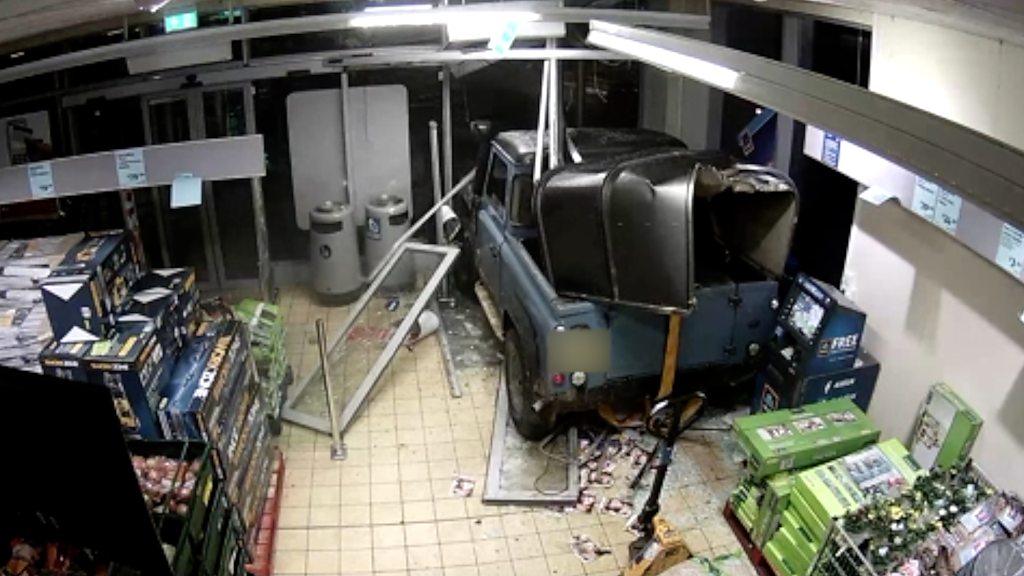Cash machine thefts: How rural communities are paying for ATM crime
- Published
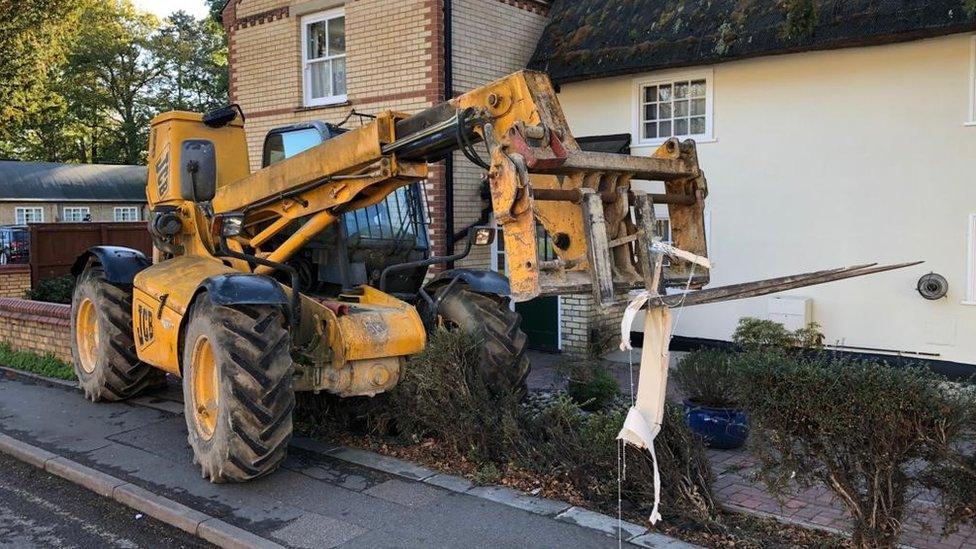
Farm vehicles are often used to remove cash machines
The past decade has seen more and more bank branches boarded up, with many rural communities left to rue the loss of a former fixture of village life. To make matters worse, the cash machines that do remain have increasingly become a target for raiders. Why is this crime on the rise - and what is being done to prevent it?
Since 2010 a third of bank branches across the UK have closed, with a recent House of Lords report finding the rural economy had been "particularly hit".
With such closures comes the loss of cash machines and, while convenience stores have sometimes filled the gap, a recent reduction in the fee they receive, and an increase in thefts, has made providing a cash machine service less viable.
Rural areas are often favoured by criminals targeting cash machines, because already-stretched police forces are hindered by the larger geographical areas they cover, according to Sarah Staff, the head of the security intelligence-gathering initiative SaferCash.
"I think the criminal fraternity know that it may take an extra few minutes for the police to be able to get to that crime scene, to give them extra time to get away," she said.
Cash machine torn from village bank
Given that cash machine thefts often involve demolishing the front of shops or banks to break free the loot, leaving behind a trail of destruction, it makes sense for criminals who want to avoid being captured to steer clear of busy city centres.
The impact of this crime on rural communities is clear. Within the space of seven months the south Cambridgeshire village of Great Shelford was hit by the double whammy of bank closures and ATM thefts.
None of the cash machines have been replaced, meaning the village's 5,000 residents have gone from having three easily accessible ATMs at the beginning of 2018 to none.
After its building was badly damaged during the forcible removal of a cash machine in October, Barclays decided to close its bank in the village - which had already lost a branch of Lloyds eight months earlier.
This has most affected those people without the time or ability to travel elsewhere for cash, according to parish council chairman Mike Nettleton, who believes local businesses have suffered.
CCTV captures 'military-like' Gamlingay shop ram-raid
"If you go back years and years, the village has been something of a commercial hub for the surrounding villages," Mr Nettleton said.
"I think we're starting to see a fall-off of people coming in because there's no longer a bank there to withdraw money."
He said he was not aware of another open bank branch in south Cambridgeshire, with villagers having to travel six miles to Cambridge or 10 miles to Saffron Walden in Essex outside the opening hours of Great Shelford's Post Office.
While it does offer limited banking facilities and cash withdrawals at the counter, Mr Nettleton believes the regular farmers' and Women's Institute markets are "struggling because people are finding it difficult to find cash".

Attempts to steal cash machines rose from 400 in 2014 to 841 in 2018 in the UK, according to SaferCash, which represents 80% of the industry.
The thefts have spanned the whole of the UK, from Devon to Norfolk to a current spree in Northern Ireland.
And 125 attempted thefts in the first three months of 2019 suggest there is no sign this crime is falling out of favour with criminals.
"It is seen as high reward, low risk for them," Ms Staff said.
"They're telling their friends and criminal associates how easy it is to commit this crime, and the risk of getting caught and the penalties are lower than if you committed another sort of crime."
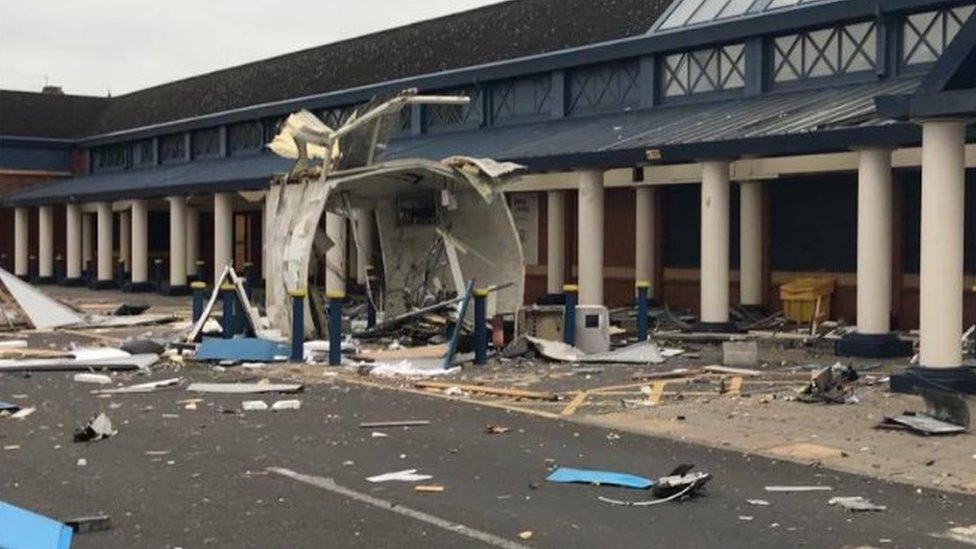
A recent report found that nearly half of all raids could be considered dangerous, because of methods deployed by criminals such as gas explosions
SaferCash shares information and intelligence with police and cash machine owners, including the methods criminals use to steal ATMs.
One that causes structural damage to buildings, often leaving shops closed for months, involves the use of farming machinery.
Ms Staff said: "We understand that farmers can't always take back that piece of equipment to their farms every day if they're working on site or in a particular field, and that is often the difficulty - a criminal may see it to steal it.
"From the analysis we are doing, they are mostly stealing on the night of the crime, maybe a couple of hours before.
"Then in the morning when the farmer goes back, he or she will try to use the piece of equipment and it's gone. Then they report it to the police and the police are already aware a crime has been committed using it."
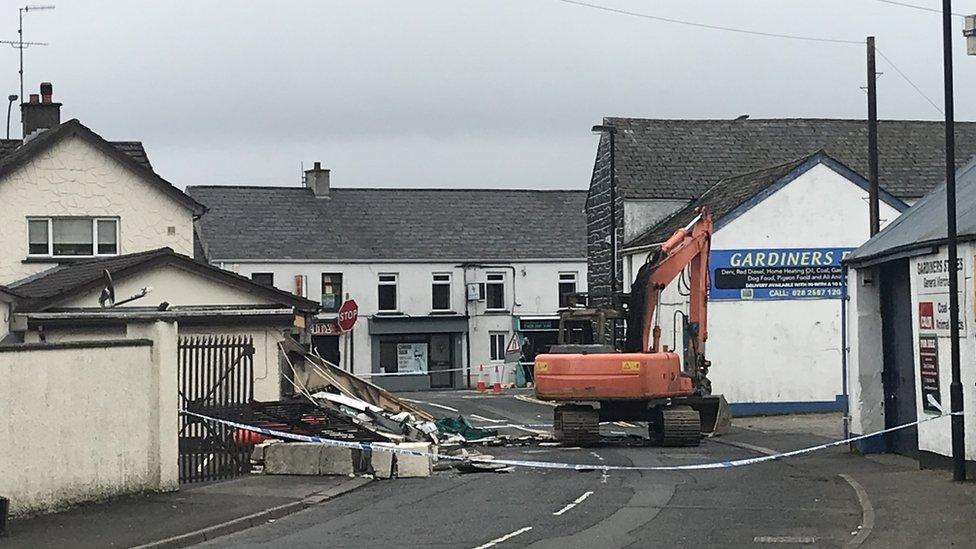
Northern Ireland is currently experiencing a spree of cash machine thefts
National Farmers' Union chief land management adviser Sam Durham is trying to raise awareness about crime prevention, including the issue of leaving keys in unattended farm vehicles.
He said this was an issue the union was trying to educate members about, as well as advising them of the "cutting-edge" technology that's available.
You might also like:
"You can create a laser barrier around your property, so you can get a notification to a smartphone or a station in the property when it leaves the farm," said Mr Durham.
Vehicles can also be tracked via GPS and he said there was a thriving start-up industry creating further security technology.
But the cost of the technology, as well as the lack of broadband coverage in rural areas, is hampering what can be achieved.
The Crown Prosecution Service described this raid as "ruthless"
A JCB being driven around rural market towns in the small hours of the morning is an unusual sight, and police believe members of the public can do their bit.
"Quite often the public are really good at taking images and putting them on to social media, but we need to have reports of suspicious activity," said Assistant Chief Constable Sarah Boycott, from the National Police Chiefs Council.
"If they see a heavy plant vehicle being driven late at night or on rural roads, then these are really good opportunities to ring the police and tell them."
Ms Boycott said businesses could also think more carefully about where they place cash machines, to make them more difficult to target.
This could include not having the machine visible from the street, according to Ms Staff, and ensuring CCTV cameras are pointed in the correct direction.
This bank ram-raid was said to be "like an action movie"
It can also mean being smart about how much money is placed in cash machines. While the cash machine industry is keen not to share how much money is kept inside them, they can sometimes contain thousands of pounds.
Many convenience store chains have been affected by this type of crime, and the Central England Co-Op said it had been working with police across the 16 counties in which it operates.
Craig Goldie, a loss prevention manager, said Co-Op's shops have a system where employees press a button to relay CCTV to a "special control room", which can then call for assistance, and motion sensors that record out-of-hours activity and allow police to be contacted when necessary.
"We are aware that incidents such as robberies and ATM thefts are frightening for store colleagues, who are our first priority," he added.
"Incidents involving ATMs also have a major impact on our customers and communities, as these machines are often a lifeline for local people and the economy."
- Published11 April 2019
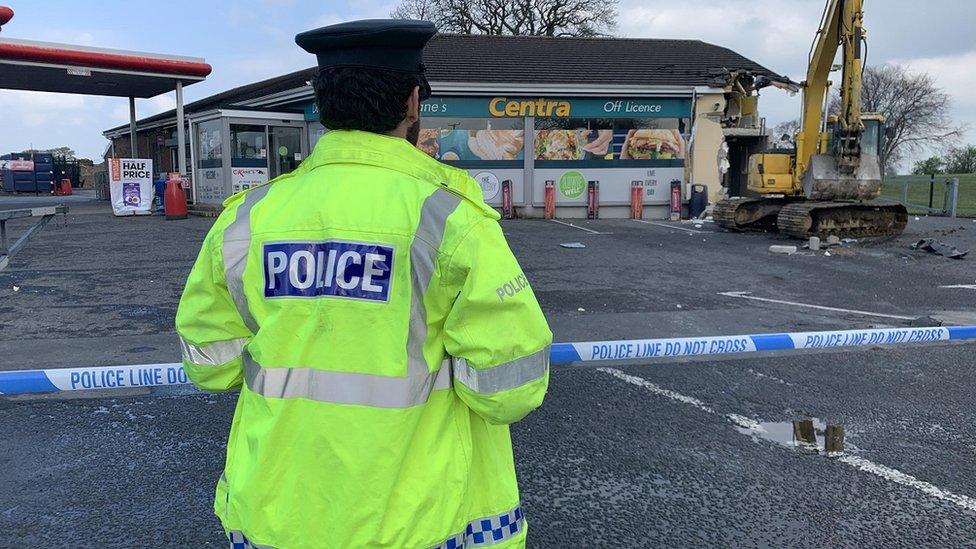
- Published7 December 2018
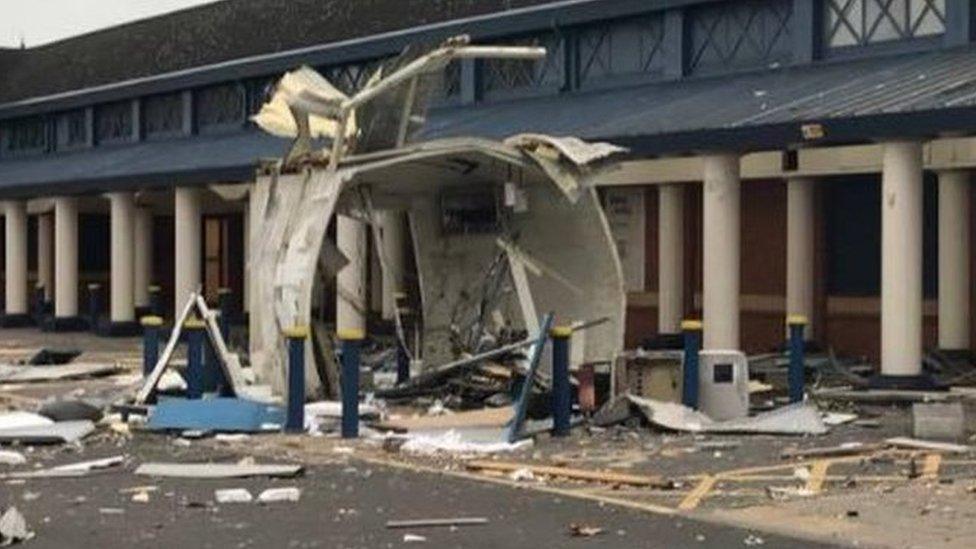
- Published7 November 2018
